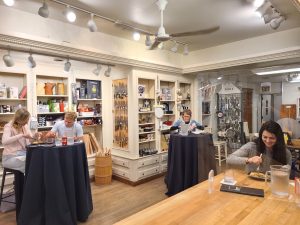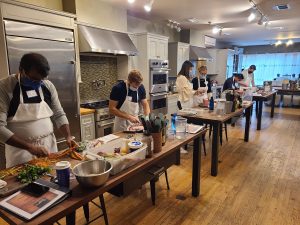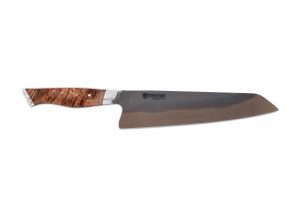Kitchenware Newswire
Sneak Peek: January’s for Organizing
Each January, Honey-Can-Do works with retailers for special promotions as organizing lands on many a New Year’s resolution list.
“Kitchens and bathrooms are going to be the focus of organization for the next couple of years,” CEO and founder Steve Greenspon said. “I think there will be a focus on storing clothing and shoes, external to closet space, with racks that are more mobile, creating more closet space.”
To read the full story, subscribe now for the January issue of Kitchenware News & Housewares Review.
Exuberant Order-Writing Seen at Las Vegas Market
By Lorrie Baumann
The organizers of Las Vegas Market are bubbling over in their enthusiasm for the performance of the most recent market session, which started on April 11 and runs through the 15th, after being postponed from January due to the COVID-19 pandemic. “The last two weeks, daily, we could feel the momentum building up,” said Bob Maricich, the Chief Executive Officer of International Market Centers, which owns Las Vegas Market as well as Atlanta Market. He noted that many buyers waited until the last minute to register for the market, but then decided to come to Las Vegas. “There’s just an unprecedented desire to get in front of people face to face,” he said.
He noted that federal air traffic counts have begun to rebound as the pandemic recedes, with the Transportation Safety Administration reporting that over the last few days, as Las Vegas Market was opening, passenger numbers were at about 55 percent of what they had been on the same dates in 2019. “People are willing to get on an airplane and travel more and more, and as more do that, you’re going to see more Market attendance because the underlying demand is there,” Maricich said. “It’s like old home week.”
“I would say that this feels like the back-to-business market,” added Dorothy Belshaw, International Market Center’s Chief Customer and Marketing Officer, who called the EXPO Center’s opening “a total game-changer in every way” and who noted that, for many of the country’s buyers, this was the first time they’ve been able to attend a trade show since the country shut down in March of 2020.
“As of yesterday [April 12], which was the second full day, attendance has tripled the total summer 2020 attendance. Based on the performance this April, we feel that we’ll see significant increases again in August,” she said. If that trajectory continues, next January’s event should look pretty much like a normal Winter Las Vegas Market, according to Belshaw.
Market attendees were very focused on the buying they needed to get done, and many who might have made a very leisurely stay at the market are instead packing all of their buying into a couple of days – but order writing during the first two days of the market was both wider and deeper than normal, as many buyers, particularly those dealing in the furniture category, were trying to work around massive supply-chain disruptions to ensure that they’ll have merchandise in their warehouses over the next several months, even if those supply-chain problems continue. “People are not here kicking tires. The people that are here are very, very serious about commerce,” Maricich said. “There’s such a demand for product that if they can get it right now, they want it…. When there’s demand, good things are going to happen, and that’s driving this sense of optimism.”
 While traffic during the first two days of the market was at 40 percent of pre-COVID levels, buying power was at 60 to 75 percent of normal pre-pandemic levels, according to Belshaw. “Independents are placing larger and deeper orders to ensure that they continue to have inventory for the next several months,” she said. “This has exceeded expectations, both for the trade show and for the showrooms.”
While traffic during the first two days of the market was at 40 percent of pre-COVID levels, buying power was at 60 to 75 percent of normal pre-pandemic levels, according to Belshaw. “Independents are placing larger and deeper orders to ensure that they continue to have inventory for the next several months,” she said. “This has exceeded expectations, both for the trade show and for the showrooms.”
This was the first trade show at which the new EXPO at World Market Center was open for temporary showrooms. The new facility was built as a public-private partnership between International Market Centers and the city of Las Vegas, and is expected to have a significant economic impact on the local market when it’s operating at full capacity, producing $97 million in annual visitor spending and filling 388,000 hotel room nights over the course of a year. For this market, and after working closely with the city’s health and safety officials, the building was operating at partial capacity, to allow for social distancing, so that instead of the 1,000 temporary booth spaces that are expected to be occupied in future markets, only 200 were there this time. “You walk into this magnificent building, with contactless registration,” Maricich said. “It looks full; it looks vibrant, and then it leads into the permanent showrooms.”
In the buildings housing the permanent showrooms, about 85 percent of the showrooms were open, as opposed to about 55 percent last summer. Most of those still closed were due to the supply-chain disruptions that limited those vendors’ access to products that they could sell, according to both Maricich and Belshaw. “We do expect 100 percent showroom participation for the summer ’21 market,” Belshaw said.
Las Vegas Market’s summer 2021 market is scheduled for August 22 through 26 for the permanent showrooms and the temporary exhibits open August 22 through 25. For 2022, International Market Centers is planning to return to the normal January schedule, with the show open January 23-27. The summer 2022 show is scheduled for July 24-28.
The Chopping Block Goes Online from Chicago
By Lorrie Baumann
When Shelley Young opened The Chopping Block 24 years ago in Chicago, Illinois, she envisioned her business as a recreational cooking school with a sideline in antiques sales. “I didn’t carry any retail other than the antiques,” she said. “It didn’t go over well with the customers that I didn’t have the products they needed.”
 Young dealt with her customers’ frustration when they couldn’t find the equipment or the uncommon ingredients to duplicate a dish they’d learned to make in cooking classes by stocking the essentials: cookware from Le Creuset and Lodge, Emile Henry bakeware and Shun and Global knives. “Our retail line has been built very strategically over the years and continues to ebb and flow and adapt considerably,” she said. “We’ll grow a category for some years, and that will wane.”
Young dealt with her customers’ frustration when they couldn’t find the equipment or the uncommon ingredients to duplicate a dish they’d learned to make in cooking classes by stocking the essentials: cookware from Le Creuset and Lodge, Emile Henry bakeware and Shun and Global knives. “Our retail line has been built very strategically over the years and continues to ebb and flow and adapt considerably,” she said. “We’ll grow a category for some years, and that will wane.”
“We carry tools rather than gadgets. If you have somebody in your life – man or woman – who is an avid car person or a woodworker, you go into their workshop, and what’s in there are tools,” she added. “I want tools…. My strategy has always been that we focus on the honest sale. I want to get things in people’s hands that serve them, that last, and 20 years later, when they pull it out of the drawer, they’ll think, I still have it. It still works…. We’re loyal to our customers. We’re loyal to our vendors. We don’t bounce around a lot. Our stories are really told through our teaching.”
A well-equipped kitchen contains a variety of tools – many might be used almost every day, and some are specialized items that may be used only occasionally. Young advises her customers to take the frequency with which they’ll plan to use an item into account when they decide how much they want to pay for it. “We do carry different price points,” she said. “That investment might be hard to swallow for something that isn’t used very often.”
 Before the pandemic curbed in-person classes at the recreational cooking school, The Chopping Block regularly held 400 classes and events over the course of a month. Young finds that many of the customers that have taken her cooking classes have given so little thought to assembling the proper equipment for a functioning kitchen that they don’t have the basics. With the pandemic keeping them at home and in their kitchens more often, some of them are discovering that they need to think more about the quality of their tools, she said. “Thermometers are a big category for us. They’re critical to teaching virtual classes,” she said. “Many people don’t have a good peeler, a good grater. They don’t even own a whisk. They don’t have a sharp knife or good cutting board. Your chopping block is your work surface – if you are lucky to have a big kitchen, get a big chopping block. Those are some of the tools that I think are super-essential, and most people don’t have good ones.”
Before the pandemic curbed in-person classes at the recreational cooking school, The Chopping Block regularly held 400 classes and events over the course of a month. Young finds that many of the customers that have taken her cooking classes have given so little thought to assembling the proper equipment for a functioning kitchen that they don’t have the basics. With the pandemic keeping them at home and in their kitchens more often, some of them are discovering that they need to think more about the quality of their tools, she said. “Thermometers are a big category for us. They’re critical to teaching virtual classes,” she said. “Many people don’t have a good peeler, a good grater. They don’t even own a whisk. They don’t have a sharp knife or good cutting board. Your chopping block is your work surface – if you are lucky to have a big kitchen, get a big chopping block. Those are some of the tools that I think are super-essential, and most people don’t have good ones.”
Under the influence of the COVID-19 pandemic, physical objects – other than The Chopping Block’s inventory of wine and spirits, which is an important contributor to the business’ revenue – abruptly became a marginalized component of the revenue stream. Young doesn’t do any online kitchenware business – if customers aren’t able to come into her stores, she’s happy to refer them to other retailers to meet their kitchen equipment needs. “Le Creuset sells directly now to consumers and through other large retailers,” she said. “It makes it difficult to position yourself as something different from anyone else.”
The Chopping Block’s two retail locations – one in Chicago’s Merchandise Mart and the other in the city’s Lincoln Square neighborhood – have been intermittently forced to close in observance of pandemic restrictions, although the Lincoln Square location was allowed to continue curbside service during partial shutdowns. While the shutdowns slammed the brakes on in-person classes for local recreational cooks, The Chopping Block’s cooking school is still going strong in cyberspace.
 Young jump-started her business’ move to online instruction by reaching out to local nonprofit organizations whose plans for fundraising events had also been thrown into disarray. I thought, What are our not-for-profit friends going to do? How are they going to have events and make money? she asked herself in those early days when Chicago’s public health authorities ordered everyone not engaged in essential activities to stay home. Young responded by reaching out to local non-profits to ask those questions and to offer help. “We’re working on new relationships with them, trying to reach out to support them, which also supports us,” Young said. “We sometimes do a class and have an option to make a donation to the charity. We have collaborated in ways that have benefited us both. We’ve developed some new relationships, and that’s rewarding as well. It’s nice to find people that you can commiserate with and feel like you’re championing them and find ways to get through this together.”
Young jump-started her business’ move to online instruction by reaching out to local nonprofit organizations whose plans for fundraising events had also been thrown into disarray. I thought, What are our not-for-profit friends going to do? How are they going to have events and make money? she asked herself in those early days when Chicago’s public health authorities ordered everyone not engaged in essential activities to stay home. Young responded by reaching out to local non-profits to ask those questions and to offer help. “We’re working on new relationships with them, trying to reach out to support them, which also supports us,” Young said. “We sometimes do a class and have an option to make a donation to the charity. We have collaborated in ways that have benefited us both. We’ve developed some new relationships, and that’s rewarding as well. It’s nice to find people that you can commiserate with and feel like you’re championing them and find ways to get through this together.”
Young’s next step was to reach out to for-profit businesses headquartered in Chicago but perhaps with branch offices and remote workers around the country and even around the world. She’s able to sell corporations on the idea that her virtual cooking events provide opportunities for team-building, for camaraderie and morale-building between employees and even for entertaining clients. “I wasn’t really aware of how giant the virtual conference industry was before COVID,” Young said. “We’re now part of virtual conferences as entertainment or breaks and international conferences with departments that want break-out sessions.”
As Young’s team works with corporate executives to bid for their online events, it’s critical that they stress that her instructors have decades of experience with professional cooking and restaurant kitchen management that they call upon to enrich the students’ experience and that her company’s collective experience can guarantee that her clients’ events will provide rewarding experiences for them and their employees. “When we’re talking to our clients, it’s partly because of our years of experience. We’ve done over 100 virtual events already. We are very serious about that business, and we respond professionally, so we make our clients look really good,” she said. “If you’re going to put together an international conference with your executives around the world, you want a professional organization. You want a party; you want to look at a menu; we do the rest. We moderate it. We teach it. We’re a one-stop shop.”
 One challenge that comes up frequently is that the client who’s considering a virtual cooking event is often someone who’s interested in cooking in his or her own kitchen, and those folks sometimes have difficulty scaling down their ambitions to a menu that their less accomplished colleagues will be able to achieve without becoming overwhelmed. That’s an issue that has to be addressed directly, Young said. “In private events, when an event might be for entertainment, the client might want an elaborate menu, but the guests might not have the capabilities,” she said. “We’re learning how to manage the host’s expectations with the experience of the guests.”
One challenge that comes up frequently is that the client who’s considering a virtual cooking event is often someone who’s interested in cooking in his or her own kitchen, and those folks sometimes have difficulty scaling down their ambitions to a menu that their less accomplished colleagues will be able to achieve without becoming overwhelmed. That’s an issue that has to be addressed directly, Young said. “In private events, when an event might be for entertainment, the client might want an elaborate menu, but the guests might not have the capabilities,” she said. “We’re learning how to manage the host’s expectations with the experience of the guests.”
Pricing for the classes is another sticky issue. “It’s hard for people to understand the value. A private event takes a minimum of four-and-a-half or five hours for the chef’s time. This is not an inexpensive venture,” she said. “Every one of our events is taught by a professional chef. We deliver high-end quality events in terms of skill, professionalism and experience teaching.”
 Once the worst effects of the pandemic are behind her, Young is confident that its lessons will remain with her and that her business will continue in the direction in which the pandemic has steered it, both in terms of how she runs The Chopping Block and how other companies will use her company’s services to support their own businesses. “There’s been some great success with organizations that have chapters around the country. Virtual is a wonderful way to do time-efficient things to support an organization,” she said. “I think these will be used on many different levels, making it possible for remote workers to feel more connected than they ever did before because now we’re all on Zoom together.”
Once the worst effects of the pandemic are behind her, Young is confident that its lessons will remain with her and that her business will continue in the direction in which the pandemic has steered it, both in terms of how she runs The Chopping Block and how other companies will use her company’s services to support their own businesses. “There’s been some great success with organizations that have chapters around the country. Virtual is a wonderful way to do time-efficient things to support an organization,” she said. “I think these will be used on many different levels, making it possible for remote workers to feel more connected than they ever did before because now we’re all on Zoom together.”
“You’re so much more on task when you’re on Zoom; you can’t stop for a sandwich during Zoom, which you might do during an all-day conference,” she added. “I’m trying to filter through all that’s happening now and look for all the gold, and I’m going to grow that part.”
STEELPORT Knife Company Debuts with Limited Edition Chef’s Knife
 STEELPORT Knife Co., an American-forged carbon steel cutlery brand handcrafted in Portland, Oregon, and dedicated to producing the finest kitchen knives available, has just launched with its first and flagship product, the STEELPORT 8” Chef Knife.
STEELPORT Knife Co., an American-forged carbon steel cutlery brand handcrafted in Portland, Oregon, and dedicated to producing the finest kitchen knives available, has just launched with its first and flagship product, the STEELPORT 8” Chef Knife.
STEELPORT Knife Co. was founded in the midst of the global uncertainties of early 2020 by Eytan Zias and an experienced team. Zias is a former chef, owner of a premier knife shop and skilled bladesmith. With 25 years experience professionally using, sharpening, selling and teaching about cutlery, plus a passion for hand forging and heat treating his own knives, Zias is a respected expert on the cutlery industry, where it’s heading and what’s missing. He has applied his extensive knowledge, experience and craftsmanship to develop STEELPORT.
“Nothing in the kitchen knife world compares to a properly forged carbon steel knife,” said Zias, STEELPORT co-Founder and Bladesmith. “With STEELPORT, I’ve created the knife I would want for myself, and included the functional details I’ve recommended for years but couldn’t find all in one product. As we reintroduce American-forged carbon steel knives, I’m confident we are contributing something truly original to the kitchen knife market for professional chefs and discerning home cooks.”
“Nearly all cutlery is mass produced overseas, but the best knives are traditionally forged and locally made by independent craftspeople on a very small inaccessible scale,” said Ron Khormaei, STEELPORT co-Founder, who was also the co-founder and past chief executive officer of FINEX, which established the modern heirloom segment of cast iron cookware. “STEELPORT fills that market gap with an entirely American-sourced and locally handcrafted knife, combining traditional processes with modern innovations to produce the finest trusted kitchen knives available to a wider audience.”
Key differentiating features of the STEELPORT 8” Chef Knife, which retails for $400, include:
- Drop Forged Full Tang: solid one-piece drop forged construction from blade tip to end cap for a well balanced and long lasting knife.
- 65 HRC 52100 Carbon Steel: proprietary heat treatment and cryo process results in a fine grained wear-resistant blade delivering first-ever exceptional hardness without becoming brittle.
- Temper Line: differential heat treatment creates a softer spine for overall durability.
- Contoured Bolster with Hand Polished Edges: smooth transition from bolster to handle for comfort, and encourages proper pinch grip hold.
- Oregon Big Leaf Maple Handle: beautiful locally sourced natural hardwood, stabilized with resin to meet tough kitchen requirements and won’t shrink or swell.
The STEELPORT 8” Chef Knife is now available for purchase on the company’s website. There are 85 knives in the STEELPORT first production run batch; these limited-edition first 85 knives will include a signed and numbered certificate with purchase.
Jars Ceramistes Releases Three New Colors for Tourron Collection
 Jars Céramistes launches three new hues with multi layers of color in its Tourron collection, showcasing the company’s expertise in the art of glazing. The new colors: Eucalyptus, Pollen and Blue Linen, burst like sunshine from the center of the plates and bowls blending glazes to create both pattern and color. The cream and black exteriors offer contrast to each piece creating a palate that is easy to mix and match with all heirloom or family-favorite tableware or accessories.
Jars Céramistes launches three new hues with multi layers of color in its Tourron collection, showcasing the company’s expertise in the art of glazing. The new colors: Eucalyptus, Pollen and Blue Linen, burst like sunshine from the center of the plates and bowls blending glazes to create both pattern and color. The cream and black exteriors offer contrast to each piece creating a palate that is easy to mix and match with all heirloom or family-favorite tableware or accessories.
The new colors feel like a spa vacation. Eucalyptus is green with undertones of gray and blue and is both rejuvenating and serene. Pollen spreads harmony and a soft canvas to complement just about any color combination, and blue linen delivers depth and dimension.
Tourron, like all Jars collections, is handcrafted in France. The dinnerware graces the tables of Michelin Star restaurants around the world, yet it is meant to be used daily in the home. It was specifically designed to be dishwasher and microwave safe.
The new colors are available in a dinner plate, dessert plate, large bowl, soup plate, pasta bowl cereal bowl, fruit cup, pitcher and oil cruet. Prices range from $38 to $86 depending upon the shape. This handmade stoneware is fired at around 2340 F. At this firing temperature, stoneware gets its very unique properties giving it the name “noble ceramic.”
Jars’ history spans more than 150 years. Founded by Pierre Jars, the traditional crafts of potters’ skills and trade secrets were passed down throughout the generations. Jars’ success resonated in Paris when he was awarded the Grand Prize at the Exposition Universelle and again in 2010 when Jars Céramistes earned EPV status (Entreprise Francaise du Patrimoine Vivant), the French Companies Living Heritage award. Today more than 50 percent of French Michelin two-and- three-star restaurants use Jars for their dinnerware service.

You must be logged in to post a comment.